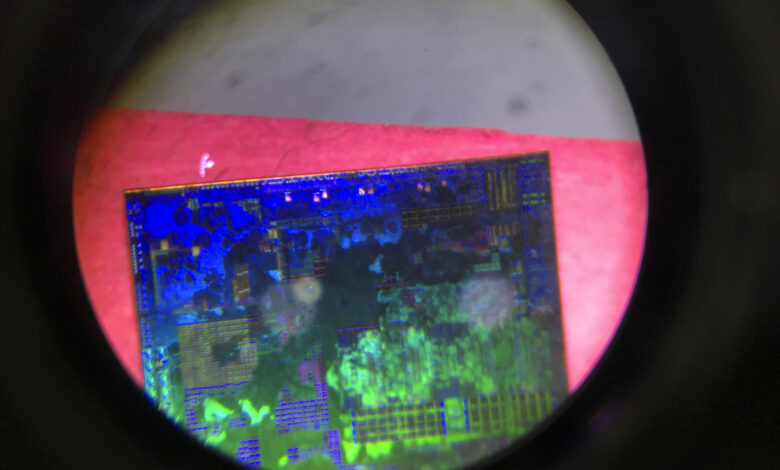At the poll in Taiwan: The worldwide microchip provide chain

Press play games to hear this text
Voiced by means of synthetic wisdom.
BRUSSELS/TAIPEI — Fail to remember Brussels, London and Washington. For the microchips trade, all ocular are on who grabs the ability in Taipei this weekend.
Taiwan is gearing up for its Saturday election — and managers from chips corporations are carefully tracking how tens of millions of citizens solid their ballots for each the legislature and the presidency.
Over the presen decade, Taiwan has grow to be an indispensable a part of the worldwide provide chain for microchips, that are impaired in the whole lot from electrical vehicles to smartphones. Particularly, Taiwan dominates production of probably the most complicated chips, accounting for more than 90 percent of the worldwide manufacturing capability.
This comes with a disclaimer, then again: China sees Taiwan as a breakaway province that can sooner or later go back to Beijing’s wrinkle. In his Fresh Hour’s cope with, Chinese language President Xi Jinping said that reunification with the island was once “inevitable.”
Saturday’s elections are not going to cause a direct shift within the world provide of chips. However a victory for pro-independence forces is predicted to extend tensions across the island, alike to what came about when former U.S. Space Speaker Nancy Pelosi visited Taiwan in August 2022. A extra China-friendly vote at the alternative hand raises questions across the West’s technique to snatch in Taiwanese chips investments and Washington’s efforts to short China’s get entry to to probably the most complicated chips generation.
It’s all a painful reminder for a few of Europe’s biggest corporations that deep-seated interdependency with and reliance on Taiwan is now a geopolitical possibility.
A story of 2 corporations
On the middle of company hyperlinks between Europe and Taiwan is TSMC, based in 1987 and one of the crucial few world gamers that may churn out complicated microchips (7 nanometers or smaller) on a immense scale.
TSMC is without doubt one of the “key customers” of Europe’s highest-valued tech corporate, Dutch microchips printing provider ASML, the ultimate famous in its latter annual file.
ASML’s chip-printing machines, which turned into the subject of a U.S.-Chinese language tit-for-tat business conflict latter generation, underpin chips hub Taiwan: Taiwanese consumers constitute 38 % of the corporate’s web gross sales and ASML has two factories at the island.
This implies ASML would possibility fat publicity if China deploys army forces based on the end result of the Taiwanese elections — one thing the corporate has prior to now said.
“We have scripts for geopolitical crises,” ASML’s Leading Monetary Officer Roger Dassen told POLITICO in January 2023. “And it’s reasonable that [in] Taiwan, but also South Korea, areas where there are geopolitical tensions, we have scripts for that.”
The Taiwanese possibility options closely in ASML’s communications to buyers. “Changes in relations between Taiwan and the People’s Republic of China could lead to additional trade restrictions and could impact our employees and the ability to utilize our manufacturing facilities and supply chain in Taiwan for our global customers, as well as our ability to service our customers in Taiwan,” the 2022 annual file learn.
The Dutch chips champion is one of the corporations which were “betting on peace in the Taiwan Strait” by means of making an investment closely within the department, mentioned Mathieu Duchâtel, director of global research on the Institut Montaigne. “If there’s a geopolitical crisis in the Taiwan Strait, of course, there will be questions for ASML,” he mentioned.
ASML declined to remark for this text, bringing up a coverage to not touch upon elections.
Taiwan’s safety predicament
Since 2021, the Ecu Union has pursued the goal of decreasing its chip dependencies, each to battle pandemic-era shortages and as it felt its reliance on overseas hubs like Taiwan have been a political and business possibility.
Paradoxically, even the EU’s try to reshore some complicated microchips manufacturing to the Continent hinges on TSMC: The Taiwanese champion latter August announced plans to seen a multibillion-euro manufacturing facility in Dresden, Germany.
TSMC’s deliberate Dresden manufacturing facility is a three way partnership with a handful of Ecu champions, together with Germany’s Bosch and Infineon and the Dutch NXP. For those companions, it’s vital that TSMC isn’t prohibited from buying and selling and making an investment out of the country.
The Dresden manufacturing facility’s good fortune could also be necessary for EU politicians, being key to the bloc’s objective of saying 20 % of the worldwide microchips price chain by means of 2030, up from 9 % now.
Additionally, it’s an indication of nearer members of the family between Taiwan and Berlin. Ultimate March, Germany’s Training and Analysis Minister Bettina Stark-Watzinger visited the island to talk along with her Taiwanese opposite numbers — science minister Tsung-Tsong Wu and virtual minister Audrey Tang — about higher cooperation on chips analysis and talents.
The Taiwanese company has been creating an excellent better funding within the U.S. circumstance of Arizona usefulness as much as $40 billion (€36 billion) that, regardless of recent troubles, is predicted to be operational in 2025.
However TSMC’s growth ambitions don’t seem to be with out controversy, even in Taiwan itself.
The chips vast has lengthy been categorized a digital “silicon shield” that is helping deter aggression by means of Beijing, as a result of China additionally is determined by TSMC for complicated merchandise.
This worries some politicians that Taiwan’s safety relies fully at the international’s reliance on its microchips.
“We’ve been striving for a very fine balance,” mentioned a senior Taiwanese business reliable, who was once granted anonymity to proportion the federal government’s pondering.
“On the one hand, it’s about deepening the West’s connection with Taiwan’s leading company,” the official said. “On the other, we ensure that the most advanced products continue to be researched and developed only in Taiwan.”
Pieter Haeck contributed reporting from Brussels. Stuart Lau contributed reporting from Taipei.




